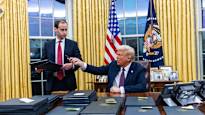Trump’s decision to leave the World Health Organization WHO means that a huge opportunity opens up for China, writes economic reporter Elli-Alina Hiilamo.
Elli-Alina Hiilamo economy reporter
– Oh, this one is a big deal!
That’s what the new president of the United States saw Donald Trump said as he signed the order withdrawing the United States from the World Health Organization. Trump justified his decision, among other things, by the fact that the United States pays significantly more fees to the organization than the much more populous China.
The decision to withdraw from the WHO is really a big deal. The United States is one of the founders of the organization and is the biggest financial supporter of the WHO. The United States has also been a very active member that has used its influence in matters concerning international health policy, says the professor of international health policy at the University of Tampere Meri Koivusalo.
WHO’s task is, among other things, to ensure that the world is prepared for various health crises, such as pandemics. The organization also guides the direction of research in the health sector and can propose contracts and make recommendations on health issues.
Trump’s decision is a risk to global health security according to expert assessment, but it can also be considered a strategic mistake.
China now gets the opportunity to fill the power vacuum when the United States weakens its own role as an influencer of international health policy. In other words, Trump is handing America’s biggest rival a kind of gift that will only allow it to grow in influence.
China seems to recognize its own opportunity. It was in response to US intentions to withdraw from the WHO quickly. Representative of the Chinese Ministry of Foreign Affairs Guo Jiakun said according to the news agency AFP, that China will support the WHO and work for global public health.
– WHO’s role should only be strengthened, not weakened, he said.
It’s true thoughthat so far China has financed the WHO with only a fraction of what the United States has. In terms of mandatory membership fees, China is the organization’s second largest supporter, but it has given little voluntary funding to the WHO – unlike the United States.
Otherwise, a large part of WHO’s funding comes from the United States. In 2022-2023, the American Bill and Melinda Gates Foundation was the organization’s third largest individual supporter. It finances the organization’s work many times more than, for example, the Chinese state.
Nor has China been a particularly active member of the World Health Organization. According to Professor Meri Koivusalo, China has rather been a “silent partner”, which has been activated mainly when the discussion is related to Taiwan in one way or another.
Yet China is a significant influencer of international health policy. Instead of cooperation in organizations, it has so far used its influence through bilateral actions. It has directly supported African countries in particular.
China has sent to the African continent even tens of thousands of doctorsdelivered corona vaccines and helped the continent establish its own disease prevention authority. A professor at Shanghai University Jiyong Jin’s according to China uses health policy to achieve their own strategic goals. Health promotion is also part of China’s gigantic Belt and Road project, with which it strives for the same economic and political foothold in different parts of the world.
China has therefore understood that international health policy also has geopolitical dimensions.
According to Professor Meri Koivusalo, with Trump’s decision, China has the opportunity to “take geopolitical points home”. The essential question is what the situation looks like from the perspective of poorer countries.
– It may seem now that China bears the responsibility when the United States leaves.
